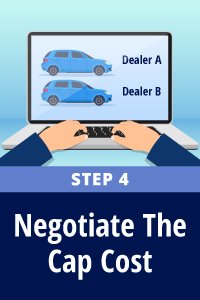Can You Negotiate the Price of a Car Lease
 Negotiating a lease is similar to purchasing a car…at least at the start. But then it gets a bit trickier.
Negotiating a lease is similar to purchasing a car…at least at the start. But then it gets a bit trickier.
Car dealers purposely make lease deals confusing to hide the true costs from you, but here are some tips to negotiate your lease.
In this step by step guide, I'll teach you how to get the best lease deal on a new car.
Table of Contents
- Step 1 – Understand How Leasing Works
- What is a lease?
- Leasing Terms Explained
- Step 2 – Look for Manufacturer Leasing Specials
- Step 3 –Get Prices from Several Dealers
- How To Get Discount Prices
- Step 4 - Negotiate the Capitalized Cost First
- How to Negotiate
- Step 5 – Determine it's a good lease deal
- The One Percent Test
- Other Negotiating Considerations
- Final Thoughts
- Best Lease Deals by Category
Step 1 – Understand How Leasing Works
 Before you negotiate, make sure you understand the basics.
Before you negotiate, make sure you understand the basics.
What is a lease?
When you buy a car and finance it, you make monthly loan payments and you own the car once you've paid off the loan.
When you lease a car, your monthly payments are lower than financing, but you don't own the car at the end of the payment term.
Once your car lease is up, you must return the car to the dealer or you can purchase the car for a set price if your lease agreement contains a lease buyout option.
Leasing Terms Explained
Be sure to familiarize yourself with this terminology.
- Lessor/Lessee: The lessor is the leasing company that grants you the lease. The lessee is you — the person who is leasing the vehicle.
- Capitalized Cost: Capitalized cost (or cap cost) is the sales price of a car being leased. It includes the car's negotiated price plus any additional costs that will be financed through the lease. The lower the cap cost, the lower your monthly payments.
- Capitalized Cost Reduction: This is similar to a down payment that reduces the vehicle sales price. The cap cost is reduced by any upfront cash you pay at closing plus the value of your trade-in. Some manufacturers occasionally offer zero down leases that do not require a cap cost reduction.
- Lease Term: This is the number of months during which you will have use of the vehicle and will pay an agreed upon monthly payment. Common lease terms are 36 months or more, but short term leases can be found as well. And in rare cases, you could also do a one-pay lease, which means you make a single payment upfront that covers all your monthly payments.
- Residual Value: The residual value of the car is the amount you would pay the leasing company if you decided to buy the car at the end of the lease (lease buyout). The higher the residual value, the lower your monthly payments.
- Depreciation: The reduction in a car's value from the beginning to the end of the lease term. This is calculated as the difference between the cap cost (minus cap cost reduction) and the residual value.
- Money Factor: This is the rate at which you are borrowing money. It's the lease equivalent of the annual percentage rate (APR) when buying a car with a loan. As with an APR, the lower the money factor, the lower your monthly payments.
- Disposition Fee: This fee covers the expense of cleaning up and selling the car after you return it at the end of the lease. Usually between $300 and $400.
- Excess Mileage Fee: Lease agreements specify the number of miles you are allowed to drive annually, usually 12,000 or 15,000 miles. If you exceed this, you'll be charged a fee when you return the car, usually between 15 to 25 cents per mile. If you decide to buy the car when the lease is over, you will not be charged any mileage fees.
Step 2 – Look for Manufacturer Leasing Specials
 Sometimes, you don't even need to negotiate a lease, "gasp!" Unlike cashback and financing incentives, sometimes advertised lease offers are simply the best deal.
Sometimes, you don't even need to negotiate a lease, "gasp!" Unlike cashback and financing incentives, sometimes advertised lease offers are simply the best deal.
This is because lease deals are not offered by car dealers directly. Instead, dealers offer leases from other lenders and captive finance companies (usually a separate division like GM Financial or Toyota Financial). As a result, dealers often do not have the flexibility to negotiate the terms of the best advertised specials.
So before you start negotiations (next step), do some research and see if you can find any models you like with good published lease deals.
Fortunately for you, we update our picks for the best lease deals every month.
But if you don't find a good advertised deal on a model you want, you still can and should negotiate.
Step 3 –Get Prices from Several Dealers
 Like purchasing a car, the best way to get a lease deal is to get prices from several dealers. When dealers compete, your price will be lower.
Like purchasing a car, the best way to get a lease deal is to get prices from several dealers. When dealers compete, your price will be lower.
And you just choose the dealer that gives you the lowest price.
How To Get Discount Prices
Get prices from several car dealers at once at the top of this website. This free service will connect you with up to five local car dealers who will email you competing car prices.
Step 4 - Negotiate the Capitalized Cost First
 Don't tell the dealer you will be leasing upfront. Instead, negotiate the car price which will later become your cap cost.
Don't tell the dealer you will be leasing upfront. Instead, negotiate the car price which will later become your cap cost.
I recommend you communicate with car dealers over email as much as possible. When you email dealers, you don't have to mention that you're leasing right away.
If you mention leasing early on, the dealer may stretch the lease term to tempt you with low monthly payments, increasing the total amount you pay.
On the other hand, if you mention leasing at a later point in time — you can focus negotiations on bringing down the price of the car.
How to Negotiate
To negotiate car price, contact each dealer and ask them to beat the best price you've received from all other dealers.
Work your way through all the dealers for the best possible car price on your new car. Use the same steps and sample emails from my new car buying guide.
After getting the best price, ask the dealer to use this as the capitalized cost for a lease. The lower the price of the car, the lower your lease payments!
Step 5 – Determine it's a good lease deal
 It's hard to know what's a good lease deal because you need to evaluate a lot of factors beyond just the cap cost.
It's hard to know what's a good lease deal because you need to evaluate a lot of factors beyond just the cap cost.
Many experts use the "1 percent test" as a rule of thumb. It's a starting point, but take this with a grain of salt because there are lots of lease terms to consider.
The One Percent Test
You've probably found a good deal if your monthly payment is less than or equal to 1% of MSRP (retail price of the car) without including sales tax. You can think of this as trying to not exceed $100 in monthly payments for every $10,000 in car price.
An example is trying to get lower than $400 per month on a $40,000 car with zero down (or only closing fees due at lease signing).
Other Negotiating Considerations
Down Payment
You may be able to negotiate no down payment on a lease. In that case, your down payment is deferred and rolled into your monthly payments.
Residual Value
You want a high residual value. The higher the residual, the lower your monthly payment. A lease amount is calculated by the difference between a car's selling price and its residual value.
Money Factor
You want a low money factor. The money factor is basically the interest rate you'll pay during your lease. The lower the number, the lower the amount of interest you will pay.
Leasing Fees
Leasing fees vary between manufacturers. You may get charged a security deposit, an acquisition fee, a disposition fee, an excess mileage fee, and so on. Some of these fees may be negotiable as well as the mileage limit.
Lease Takeover
Companies like Swapalease allow you to buyout and takeover a lease from someone who wants to get out of a lease early. This may be a good option if you are looking for a used car. Learn how Swapalease works in my review.
Final Thoughts
Remember, negotiating a car lease can be tricky. You'll want to negotiate the price first and have a dealer use that as your capitalized cost. But even then, dealers can play games with all the other leasing variables to make you pay more in the long run.
So save yourself some time and check out our picks for the best lease deals because many times these may actually be better than what you can negotiate on your own. It also helps to prepare by knowing some important questions to ask when leasing a car.
Can You Negotiate the Price of a Car Lease
Source: https://www.findthebestcarprice.com/how-to-negotiate-a-car-lease/